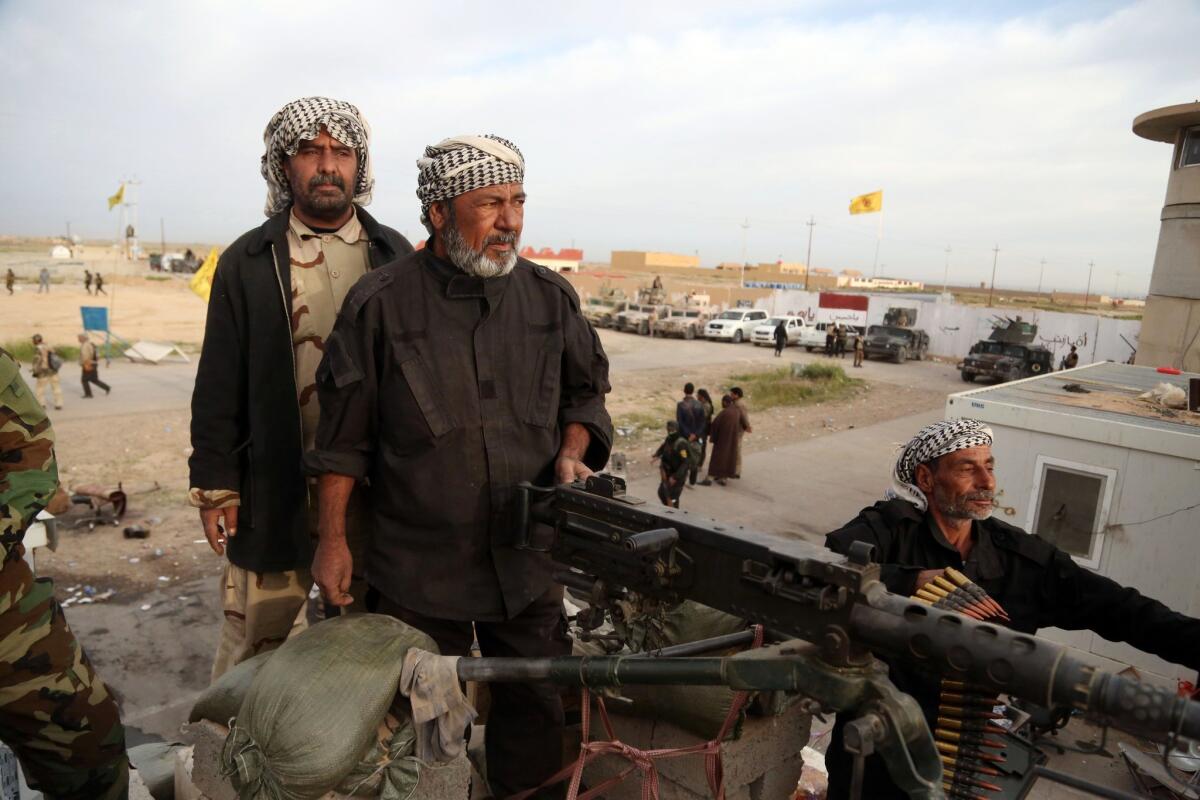Iraqi offensive in Tikrit gaining ground, government backers say

- Share via
Reporting from Dahuk, Iraq — Iraqi government forces and allied militiamen pressed an all-out assault in the city of Tikrit on Thursday, one day after troops fought their way into the militant stronghold and hometown of Saddam Hussein.
The offensive, which began last week and is said to involve as many as 30,000 fighters, is the government’s largest offensive to date against Islamic State, the Sunni Muslim extremist group that swept through much of Iraq’s Sunni heartland in northern and western Iraq last year, often with the support of area residents.
Pro-government accounts on Thursday suggested that much of Tikrit was under the control of security forces, though there was no independent corroboration of the reported advances in Tikrit, 80 miles north of Baghdad, the capital.
Army units backed by Shiite paramilitary groups and tribal fighters entered Tikrit’s Qadisiya neighborhood, as well as a compound of palaces built by Hussein, the late Iraqi strongman, according to pro-government accounts. The troops also seized three strategic thoroughfares in the city, leaving only a few areas under militant control, the semiofficial media reported.
Slowing the advance of security forces were sniper fire and hundreds of explosive devices placed along roads, in houses and elsewhere.
“The military operations themselves are essentially complete, but what remains is cleansing the area and removing bombs,” said Hisham Hashimi, an Iraqi researcher in security affairs reached by phone in Baghdad. “This is the difficult part.”
Iraqi officials predicted “the final victory” in Tikrit in the days to come, according to state news broadcaster Al Iraqiya.
Success in Tikrit would represent Baghdad’s most significant blow against Islamic State since the militant group’s advance last year. It would also be a major confidence-builder for the central government after last year’s humiliating army retreat in the face of the extremist thrust deep into Iraq.
Retaking Tikrit would also open a corridor to attempt the more daunting challenge of winning back Mosul, a much larger city about 140 miles up the Tigris River. Like Tikrit, Mosul’s population is largely Sunni Arab and has long been hostile to the Shiite-led government in Baghdad.
Despite the participation of paramilitary groups organized along sectarian lines, government officials have lauded the Tikrit offensive as an example of how the fractured nation’s diverse groups can unite against a common enemy. While Shiite irregulars linked to Shiite Iran are spearheading the attacking forces, along with largely Shiite Iraqi army and police units, several thousand Sunni militiamen are also involved in the fight.
“The most important victory we achieved is our unity in defense of the homeland,” Iraqi Prime Minister Haider Abadi said Thursday, according to Al Iraqiya. “For the first time we are fighting Daesh on several fronts and are victorious in all of them,” Abadi said, using the Arabic acronym for Islamic State, which is also known as ISIS or ISIL.
The United States and its allies have largely been absent from the Tikrit offensive, despite an ongoing aerial bombing campaign against Islamic State targets elsewhere in Iraq and neighboring Syria. But Shiite Iran, a key partner of Baghdad, has reportedly been heavily involved in the fight through allied Shiite militias.
The militias’ prominence has stoked concern about sectarian reprisal killings of Sunnis in Tikrit, once home to more than 200,000. Much of the civilian population has fled the town.
Last year, Islamic State forces outside Tikrit reportedly massacred hundreds of Iraqi security personnel, mostly Shiites, who were captured at a former U.S. military base known as Camp Speicher. The mass killings outraged Iraq’s Shiite community and drew calls for revenge. Islamic State, an Al Qaeda breakaway faction, views Shiites as apostates.
Advancing pro-government forces have found evidence of a number of mass graves, including a pair apparently containing the remains of some of the Camp Speicher victims, said Naim Abboudi, a spokesman for the League of the Righteous, a prominent Shiite militia, reached by phone from Baghdad. Authorities will attempt to verify the identities of the victims, he said.
Twitter: @mcdneville
Bulos is a special correspondent.
More to Read
Sign up for Essential California
The most important California stories and recommendations in your inbox every morning.
You may occasionally receive promotional content from the Los Angeles Times.













